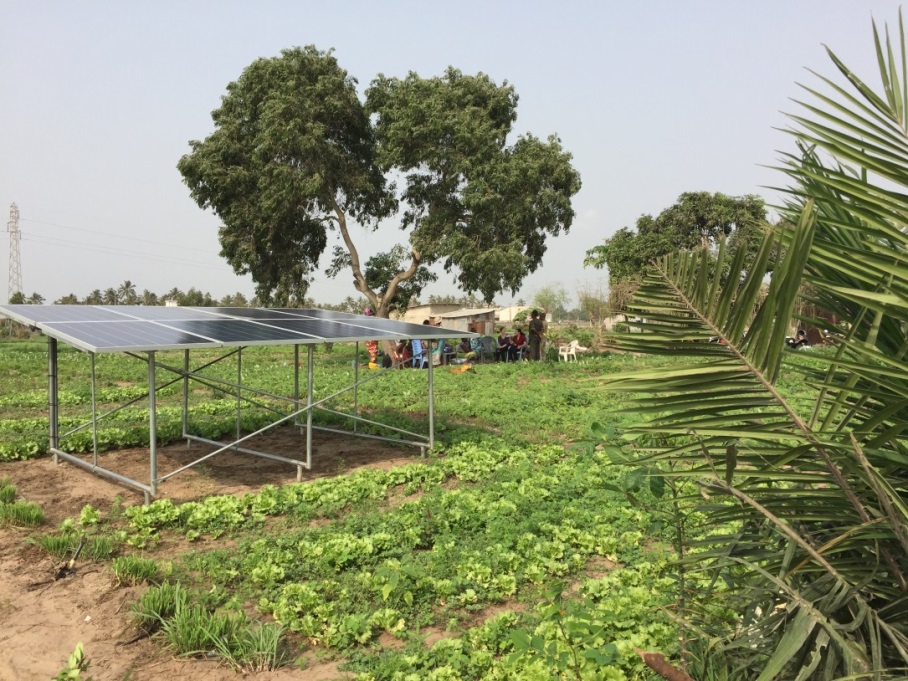Can Solar Irrigation Help Farmers?

Agriculture accounts for 70% of Benin’s employment and 35% of its GDP, making agricultural production an area of critical development. Improving current irrigation methods can significantly increase production and processing for local farmers by enabling them to produce even during the two dry seasons, because it gives farmers the ability to artificially provide water for their land without relying on rainfall. The common irrigation methods used by farmers in Benin, especially during the two dry seasons (from November to February and during August and September), totaling six months, are gas-powered pumps and manual watering by hand. A manual irrigation system requires a large amount of labor and often results in crop wastage from improper watering. Gas powered irrigation pumps are very expensive to operate and emit a substantial amount of pollution into the air and soil. PfD hypothesized that farmers in Benin would greatly benefit from cost effective, solar based irrigation technologies that are environmentally friendly, both for the farmer and the soil.
For the GREEN Project in Benin, PfD tested solar-powered irrigation pumps to determine if they could be a cost-effective approach and nonpolluting method to improving vegetable production. Solar panels are installed in each solar irrigation pump to power the surface pump’s internal electric motor. Once the motor is running, water is pumped from the pond directly onto the fields through hoses or sprinklers, or pumped into storage tanks to be used for later. The advantages of a water solar irrigation pump include:
- No fuel cost
- Non-polluting
- Low maintenance cost
- Produces water when vegetables need it most
- Highly reliable and durable
- Easy to operate
- Easy water storage
For the GREEN Project in Benin, PfD tested solar-powered irrigation pumps to determine if they could be a cost-effective approach and nonpolluting method to improving vegetable production. The two types of solar-powered irrigation pumps tested for the pilot were GRUNDFOS and LORENTZ PS 150. Both models have been used to power irrigation systems in northern states of Benin, but neither had ever been tried in the southern region of the country, where PfD operates. PfD brought 450 farmers to six different test sites throughout the southern regions to participate in the pilot.
Results from the test exhibited that both the GRUNDFOS pump and the LORENTZ PS 150 pump can be used effectively in southern Benin and would substantially reduce irrigation cost and pollution. Both pumps are also guaranteed for 25 years, which could potentially save farmers $63,000 or more during that time period. The German Cooperative Development Agency has also agreed to provide a reduction of up to 40% of the initial installation cost to convert to solar-powered agricultural equipment for all Beninese farmers for the next five years. Several GREEN farmers expressed interest in buying the solar system and in taking advantage of the reduced price.

Shortly after attending the test pilot, farmers installed a solar irrigation system in the Semi-Podji district. The group, which used a gas-powered pump before, notes that the new solar irrigation system covers around 2.5 acres of land and has saved them over $200 per month, which is a considerable amount of money for the group. Through the GREEN Project, PfD was able to effectively show how using innovative technologies like the solar-powered irrigation pump can be used to achieve sustainable development in communities. We hope that many other farmers will transition to a solar-powered irrigation pump system to achieve the same results.
Partners for Development is always seeking support from individuals and organizations in order to improve the quality of life in developing countries. Become a Partner for Development Today! With your contribution, other innovative technologies and key activities can be implemented to make a difference in the lives of those that need it most. To make a gift please click here!

